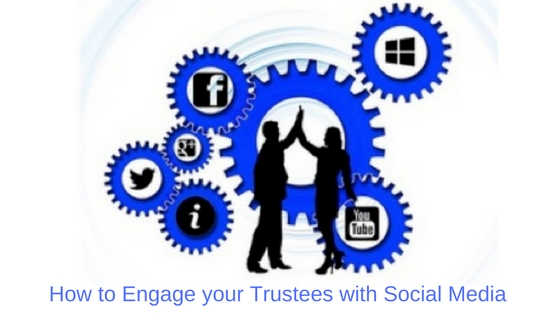How to Engage your Trustees with Social Media

Charity trustee boards don’t always see social media as an essential communications tool.
The use of social media in organisations over the last few years has grown dramatically among charity staff and trustees, according to Onboard’s report Governing with Intent.
But even with this growth, social media is not high on the boardroom agenda. According to the latest FT-ICSA Boardroom Bellwether survey, 47% of boards have not discussed a social media policy (Winter 2015). Only 5% of board has discussed social media more often. Only 25% of respondents describe a social media policy as important (or very important to the board) 46% are now neutral, and 25% describe it as unimportant or do not have a strategy. There is a disconnect between perceived reputational risk and interest in social media. Most companies have their own Twitter account and Facebook page to help build customer relationships and engagement. This brings many advantages, but needs to be properly monitored and managed.
Charity boards are lagging behind their staff in their attitude to digital technology and are not placing new technology at the forefront of their thinking.
5 things boards can do to engage in digital communications
1. Use as a source of feedback for the organisation
Boards should explore the possibilities of the digital agenda and its development for the organisation. Social media can be used for feedback from users and beneficiaries. Reports of feedback should be given to the board as this is an important tool to monitor performance, inform strategic planning and increase the quality and impact of services.
Social media is a place where trustees can gauge how their organisation is being perceived and have evidence of the ‘external and internal’ images.
2. Introduce a board portal
To increase engagement with digital tools and to improve efficient governance, trustees should consider using a board portal. The portal would integrate email, online calendars and document management software. The Onboard Wired to Govern poll showed LinkedIn groups being set up for board members to communicate between board meetings. More boards are using WhatsApp to exchange views in between meetings.
3. Understand how to manage risk
Trustees should explore what they can do to manage risk. It’s important that they protect their data, staff and service users from cyber issues such as malware, phishing scams, email attacks, hackers and trolls.
They also need to ensure that financial controls provide sufficient security for online giving, and due diligence procedures are carried out before third parties are hired to manage online donations. Mobile phone and tablets used by charity staff are increasingly at risk from criminal attack.
The Bring Your Own Device (BYOD) trend weakens the security of data. Charity staff and trustees may consider moving to a Choose Your Own Device (CYOD) regime that consciously limits the number of devices that have access to data systems. Investing in anti-theft software and adding extra layers of verification is highly recommended.
4. Provide support to young trustees
Boards need to be able to attract young trustees and support them in the appropriate use of a multi-media approach. Younger trustees or advisory boards are more likely to have a different approach to social media and should be supported by both the social media managers and the board.
5. Introduce clear procedures
Boards must monitor the different platforms the organisation uses. Whether using Twitter, Pinterest, LinkedIn, Google chatrooms, Facebook or any of the many platforms out there. Multi-purposing of different channels can also be quite helpful. Boards need to ensure there are sufficient procedures, processes and policies in place to guide their use. Trustees should receive adequate training to be able to do this effectively.
Aimed at new trustees, the Charity Commission recently produced guidance Making digital work: 12 questions for trustees to consider. (www.gov.uk/government/publications/making-digital-work-12-questions-for-trustees-to-consider )






